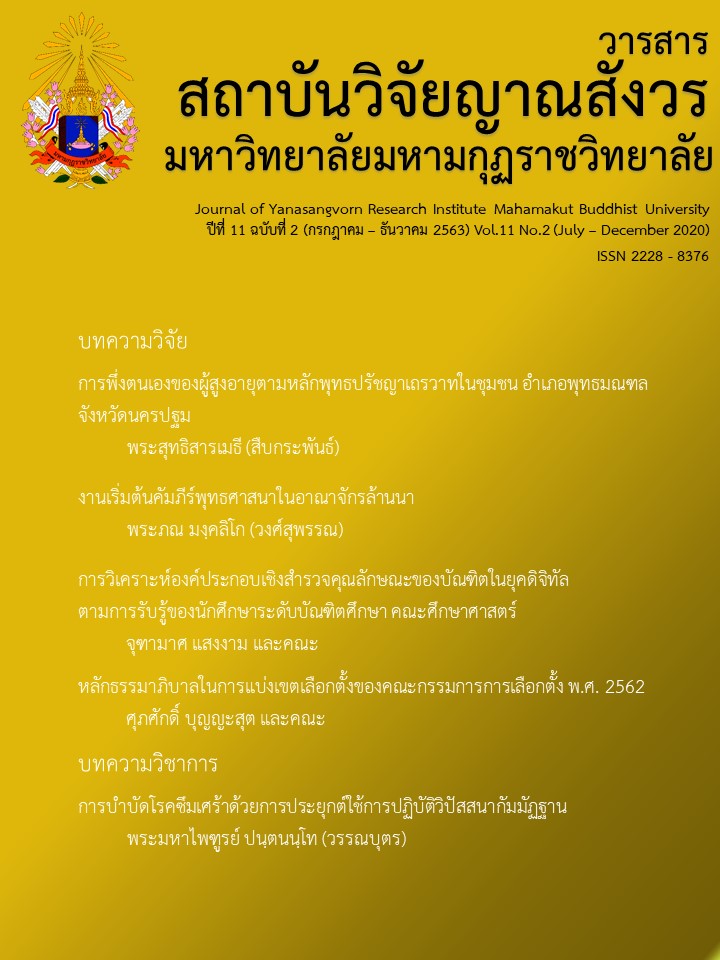EXPLORATORY FACTOR ANALYSIS OF GRADUATE ATTRIBUTES IN DIGITAL AGE BY PERCEPTION OF GRADUATE STUDENTS AT FACULTY OF EDUCATION
Main Article Content
Abstract
The purposes of this research were to study state of graduate attributes by perception of graduate students at faculty of education and to analyze factors of graduate attributes in digital age by perception of graduate students at faculty of education. 248 graduate students who consisted of 132 master’s degree students and 116 doctoral degree students were collected by using questionnaire and analyzed by using descriptive statistics and exploratory factor analysis.
The results were as follows: 1. State of graduate attributes by perception of graduate students were classified 7 dimensions. Mean of all dimensions were high level and the highest mean was the dimension of intellect (M = 4.44, SD = .51) and academic competence (M=4.41, SD=.46) respectively and the least mean was the dimension of occupation (M=4.29, SD=.65)
- Graduate attributes in digital age were extracted 7 factors which are 1) morals and ethics 2) academic competence 3) intellect 4) decision 5) leadership 6) occupation and 7) administration.
Article Details
References
บุษกร จินต์ธนาวัฒน์. (2558). แนวทางการเตรียมความพร้อมในการประกอบอาชีพของนักศึกษามหาวิทยาลัยศิลปากรเพื่อรองรับการเข้าสู่ประชาคมเศรษฐกิจอาเซียน. วิทยานิพนธ์ปริญญามหาบัณฑิต สาขาวิชาการจัดการทั่วไป มหาวิทยาลัยราชภัฏนครปฐม.
สำนักงานคณะกรรมการการอุดมศึกษา. (2550). คู่มือกรอบแผนอุดมศึกษาระยะยาว 15 ปีฉบับที่ 2 (พ.ศ.2551-2565). กรุงเทพมหานคร: กลุ่มพัฒนานโยบายอุดมศึกษา สำนักนโยบายและแผนการศึกษา สำนักงานคณะกรรมการการอุดมศึกษา.
สุวิทย์ เมษินทรีย์. (2558). แนวคิดเกี่ยวกับประเทศไทย 4.0. เข้าถึงข้อมูลได้จาก http://planning2.mju.ac.th/government/20111119104835_planning/Doc_25590823143652_358135.pdf.
Barrie, S. C. (2004). A research‐based approach to generic graduate attributes policy. Higher Education Research & Development, 23(3), 261-275.
Bozalek, V., & Watters, K. (2014). The potential of authentic learning and emerging technologies for developing graduate attributes: Part 2: HELTASA 2012 Special Section. South African Journal of Higher Education, 28(3), 1069-1084.
Christensen, S., & Kift, S. (2000). Graduate attributes and legal skills: Integration or disintegration. Legal Educ. Rev., 11(2), 207-239.
De la Harpe, B., & David, C. (2012). Major influences on the teaching and assessment of graduate attributes. Higher Education Research & Development, 31(4), 493-510.
Denson, N., & Zhang, S. (2010). The impact of student experiences with diversity on developing graduate attributes. Studies in Higher Education, 35(5), 529-543.
Gilbert*, R., Balatti, J., Turner, P., & Whitehouse, H. (2004). The generic skills debate in research higher degrees. Higher education research & development, 23(3), 375-388.
Shafaei, A., Nejati, M., & Maadad, N. (2019). Brand equity of academics: demystifying the process. Journal of Marketing for Higher Education, 29(1), 121-133.
Ipperciel, D., & ElAtia, S. (2014). Assessing Graduate Attributes: Building a Criteria-Based Competency Model. International Journal of Higher Education, 3(3), 27-38.
Mager, S., & Spronken-Smith, R. (2014). Graduate attribute attainment in a multi-level undergraduate geography course. Journal of Geography in Higher Education, 38(2), 238-250.
Platow, M. J. (2012). PhD experience and subsequent outcomes: A look at self-perceptions of acquired graduate attributes and supervisor support. Studies in Higher Education, 37(1), 103-118.
Stracke, E., & Kumar, V. (2014). Realising graduate attributes in the research degree: the role of peer support groups. Teaching in Higher Education, 19(6), 616-629.


